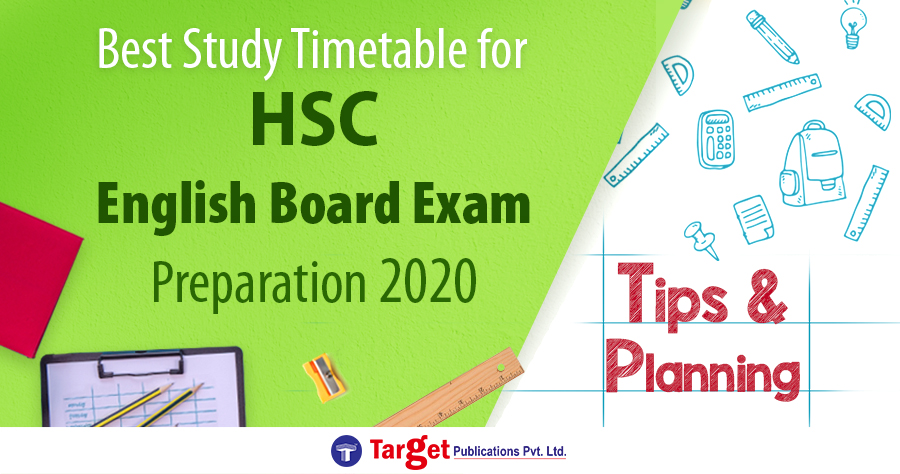Best Study Time Table for HSC English Board Exam Preparation 2020: Tips & Planning
Best Study Time Table for HSC English Board Exam Preparation 2020: Tips & Planning

Why be a sheep and let yourself be dragged along in the bandwagon effect when you can get a chance to score more? English Board Exam is quite scoring if you know how to make up a timetable for it if you don't just find but apply certain sure-shot tips and plan in an uber-smart manner. Students from Science and Commerce begin to juggle numerous competitive examinations while appearing for the HSC Board Examination, such as the NEET UG, JEE Main, CPT, MHT-CET and so on. This year is equally crucial for Arts students as they begin their preparatory journey for the civil services examinations.
Generally, students don't opt for a coaching class for languages, as they prefer to go about the self-study way. Again, this self-study is confined to a month before the HSC Board examination, where they begin to run a helter-skelter in order to find the best HSC books to help them sail through the examination. There are three words, which you must remember like the back of your hand if you wish to score, equally excellent marks in languages, more specifically in English. These three words are: Planning and timetable. Before you launch yourself into the super-study mode, it is important to completely understand the HSC Board Curriculum for English.
How should the best study timetable for HSC Board English be?
The Maharashtra State Board of Higher Education focuses on the development of a select few qualities in students when it comes to formulating the syllabus for English. These qualities are namely, functional, aesthetic and cultural. An HSC Board student should be able to excellently communicate, read, write and be aware of all the nuances of the English language. Now let us get into the technical details of the subject.
The HSC Board English textbook chiefly comprises of:
- Prose (Chapters) and Poetry (Poems) divided into Eight Units
- Literary and Non- literary texts are placed under a separate section titled 'Rapid Reading'
- Grammar, Vocabulary and Writing Skills sections
It is important to have three sets of timetables for English. Ideally, this is what your time-table must comprise of:
- Monthly Time-table: Divide all 8 Units over a period of 4 months, where you will thoroughly study two units per month
- Weekly Time-table: Allocate two weeks per unit and classify the number of grammatical concepts and writing skills that come as a part of every unit and the chapters within
- Daily Time-table: Plan your day in a way that you are able to keep aside at least half an hour to either read or study the English textbook
Tips that will help you plan and optimise your study timetable:
1. It's all about customization:
The first step towards following any timetable is to customise it according to your own needs. Here as English is the only subject in question, you need to add other subjects to your schedule in addition to other commitments such as your coaching classes.
2. Say no to distractions:
When you start studying, make a decision to stay away from every type of distraction that will prove to be a hindrance for you. This includes attending phone calls, surfing the web, listening to music, watching T.V, or chatting on social media websites. You need to absolutely turn away from all such activities, the moment you sit down to study.
3. Don't let breaks, break you:
Everyone needs to take a break every now and then. However, being able to stick to a timetable should not really be all about taking breaks. In the initial few days, begin your day by trying to get an idea of how much time you might spend not studying in a day. As time passes and the HSC Board exams inch closer, begin to slowly cut down upon that time and dedicate most of your time to studying.
4. Textbooks and Question Papers:
The education board designs HSC textbooks in such a manner that they are able to serve all the educational needs of a student. Thus, it becomes important to treat them as your endgame resource. Apart from textbooks, refer to HSC Board's previous years' question papers, which will help you determine the most important questions and give them appropriate time in your timetable.
5. Reference material:
Most of the HSC Board books are cleverly put together to serve as perfect companions to your textbooks. This is because of their salient characteristics which help students go the extra mile and create a robust concept base. For instance, if we take an HSC English book, it would provide students with extensive coverage of all chapters and poems in accordance with the question paper as well as grammar concepts and writing skills. This would only add more value to your preparation.
Every year close to 15 lakh students appear for the HSC Board Examination, popularly known as the Higher Secondary School examination. This exam is one among the most important milestones in a student's life. Excellent performance in this examination guarantees the opening of lucrative career avenues for a student's future. Although it is just an examination like any other, it puts a great amount of pressure on students belonging to all streams of education
All this extra preparation might put students under a great amount of pressure, which would ultimately lead them to categorise subjects on the basis of their importance. During this struggle to zero in on the most important subjects, most of languages are unabashedly pushed along the sidelines. This is the sad case of the English subject and gradually but surely results in candidates scoring much less amount of marks in the HSC English Board Examination.
We hope that this article did more than just bring out the importance of the English language. If you are an HSC Board student on the lookout for the best HSC Book for English, then you must check it out on our website. Happy studying and all the very best for the HSC board examination!




